- QATestLab Blog >
- QA for Business >
- Industries Insights >
- How to reduce business risks through testing CRM
How to reduce business risks through testing CRM

CRM system ensures efficiency of sales, database processing and communication with clients. The smallest system error will affect teamwork and productivity. In cases of late stage errors, fixing will take a long time. Testing can help avoid such consequences and ensure that the system runs smoothly.
Failures of CRM systems that can lead to business risks
If you skip the testing stage while developing a CRM, you will face different business risks. In bad cases, the company can lose profits and customers. Below are the most common problems with CRM systems that can affect a company’s business. These problems prove that testing is necessary and a very important part of CRM development.
Difficulties with access rights
All employees do not have the same level of access to the database. It can be difficult for employees to get the job done because they will not be able to carry out their duties without access. There is also a possibility of a breach of confidentiality in a company. It will not be good if the wrong person gets access to data that was intended for another person.
System performance delays
Ideally, a CRM system should be responsive. Unfortunately, delays can be caused not only by slow equipment but also by inconsistencies in the system code. Because of this, companies may discover the inability of a CRM system to be multitasking and highly productive.
Incorrect status display
If the client’s status is displayed incorrectly or employees cannot change it, more than one employee may contact the client several times. Such a situation can spoil the impression of the company, and the client will think that the team is too persistent or that the work in the company is not organized.
Inaccuracies in telephony
The well-coordinated work of communications in CRM systems is vital. Without testing communication channels, there is a risk of blocking incoming messages or calls and erroneous forwarding, leading to the loss of potential customers.
Problems with the mobile app
The use of mobile CRM systems significantly increases the advantages over competitors. Employees can track and enter data, as well as provide quick responses and service. However, without testing the applications, the company may lose this opportunity.
Errors in notification
Reminders are an essential part of working with clients. If the CRM system sends incorrect notifications or ignores them, employees may miss important events or information.
Incorrect data
Testing is needed to make sure that the CRM system meets all the standards and requirements. Otherwise, the system may not work correctly, which as a result will lead to the loss of data, the appearance of duplicates, and the display of classified data.

Benefits of testing CRM systems
Companies often choose to skip the testing phase because they don’t know what it can do. Experts do not just determine whether the system can do what is expected; they do important things for business purposes.
Avoid additional costs
If bugs are discovered too late, this can lead to a reorganization of the entire system. Specialists can find potential or real shortcomings that can be eliminated in the first stages.
Save time
Testers can identify inaccuracies in the system, so that developers no longer need to waste their time doing it.
Have the edge over other competitors
Testing a CRM system will help avoid deadline violations, production downtime, or misunderstandings in the team and with customers.
An independent testing team can provide a ‘fresh look’ to find new bugs and offer a wide range of services of QA engineers with expertise in the relevant field avoiding recruitment process. It can extend the team to cover tasks urgently, and reduce the downtimes.
What we can test
Our team can perform the following checks to be sure that your software works correctly:
- all communication channels with the client as the main task of any CRM is to increase sales efficiency and customer service;
- CRM updates – before the release of each update, it is vital to test not only the new functions that the update carries, but also make sure that the old functionality works excellently;
- integration of CRM with external services, since the CRM system is a complex product, which uses additional services.
Conclusion
Bugs in the CRM system affect the company’s financial position, can lead to the loss of customers, and reduce profits or cause budget overruns. Therefore, it is worth remembering the vital stage of testing a CRM system to avoid such consequences. Our team will be happy to help you test your product. If you want to get the best CRM software testing for your company or business, contact us.
Learn more from QATestLab
Related Posts:
- Quality Assurance for CRM: popular questions and common myths
- E-Show Madrid 2025: Accessibility as a Key Challenge
- Automation Testing for Mobile Apps: Why It’s Essential and Our Key Services
About Article Author
view more articles







No Comments Yet!
You can be the one to start a conversation.